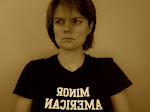Dangerous to start discussing a book you haven’t entirely finished, especially if you plan to use it to make a point. But having read most of Anne Winters’s The Displaced of Capital in one rush last night, I feel even more strongly that experimental poetries, those concerned primarily with semantic play, are limiting themselves by what they leave out. One of the stand-out books by one of my peers last year was Jo Ann Wasserman’s The Escape, which courted controversy by allowing itself to be exhibitionistic. Just the premise—that it was about her mother’s death when she was 18—caused some poets I know to shut down.
It was about something?
It was about her mother?
It was about her mother’s death?
Getting past that hurdle, anyone who picked up the book then had to contend with self-mythologizing (sexy bad girl) that turned some people off (myself included) and some people on (Tony Towle reviewed it twice!). The point is, though, that she took a chance on writing a heartbreaking work, staggering genius arguable.
Thus Anne Winters. I’m not inclined to buy many books by University of Chicago poets, but I read “The Mill-Race” online, was blown away, got the book. Was blown away. Maybe I’m a sucker for the subject matter—the brutal economics of New York. Maybe, as with the Wasserman, I am too susceptible to the catharsis of tragic storytelling in whatever form (“An Immigrant Woman”). But if I’m attracted to her concerns I’m also attracted to her vocabulary: an engineering vocabulary, a vocabulary of infrastructure. It’s earthy, smithy, tough.
One could complain that she’s championed by Pinsky, complain that she’s too literal in some places, too ornate in others. I just don't want to hear that she’s not avant-garde. That’s a descriptor sought after by some of the most vapid books of our time, cf. Lisa Robertson’s The Weather—hiding its emptiness behind a quote from Arcades Project!—and, to bring it home for the movie-going friends, it’s the same reason In the Mood for Love is a hundred times greater than Chungking Express.
Friday, February 25, 2005
Subscribe to:
Post Comments (Atom)


3 comments:
Fallen Angels is also a hundred times better than Chungking Express.
Ange, if you consider The Weather (which I haven't read) empty, what is your opinion of Seven Walks and Occasional Work from the Office for Soft Architecture? Certainly it references emptiness and the surface as concepts, with continual nods to Baudelaire's/Benjamin's avant-garde (or would that then have been modern?) flaneur, but it does so with a spirit that feels timely to me and profoundly full of content.
That said, I often feel likewise: work that has edge is not necessarily avant garde; works that purport to be avant garde do not always have true edge. I'm a big fan of Mary Gaitskill myself--true edge.
Thanks for the thoughts on Wasserman and Winters.
-Pam
Happy Together was much better than Fallen Angel, Chungking, or any of his other films. Happy Together is one of my favorite films, not just for the amazing camera work, the attention to detail for sound, light, etc., but also because of the emotional content of the film.
I'm a poet who really LIVES for the emotional content. This is why I am one of Magdalena Zurawski's biggest fans! Her novel will tear your ass up!
CAConrad
http://PhillySound.blogspot.com
yow. not sure I get as much pleasure out of getting my ass torn up (tho hell, I've never tried it), but I do look forward to Maggie's novel...
Post a Comment